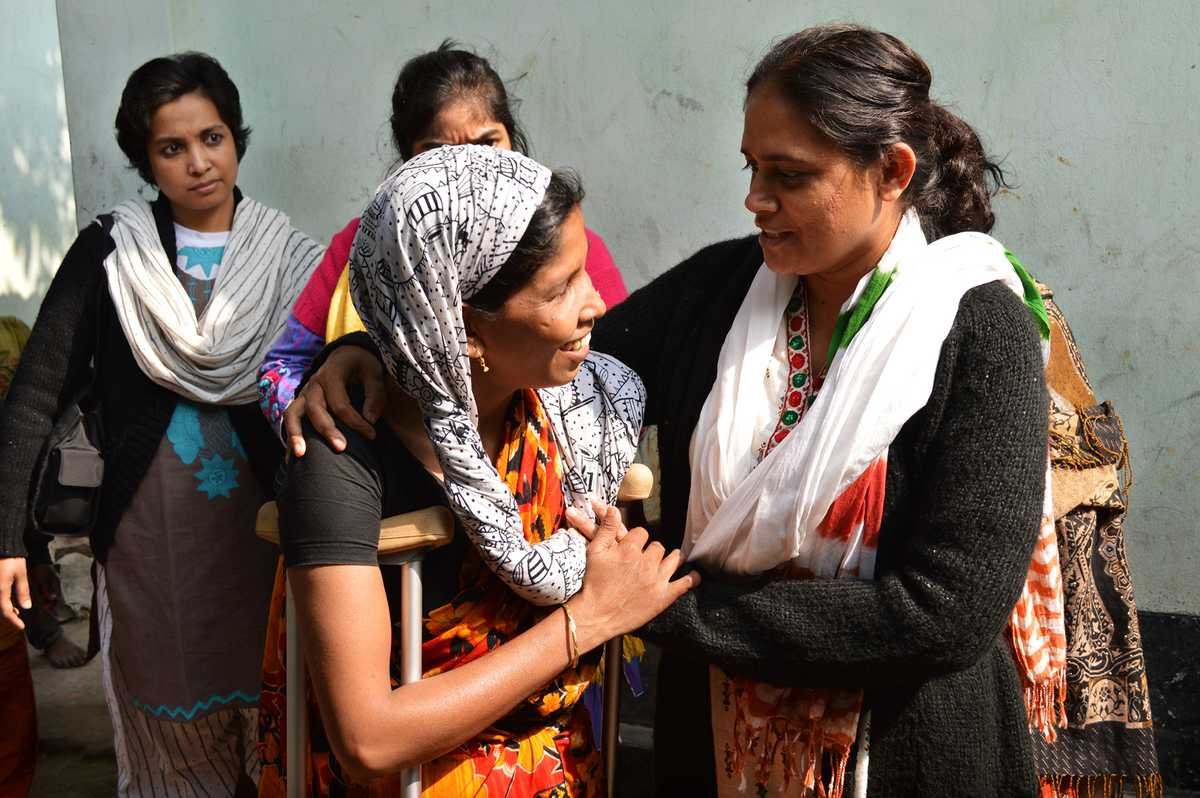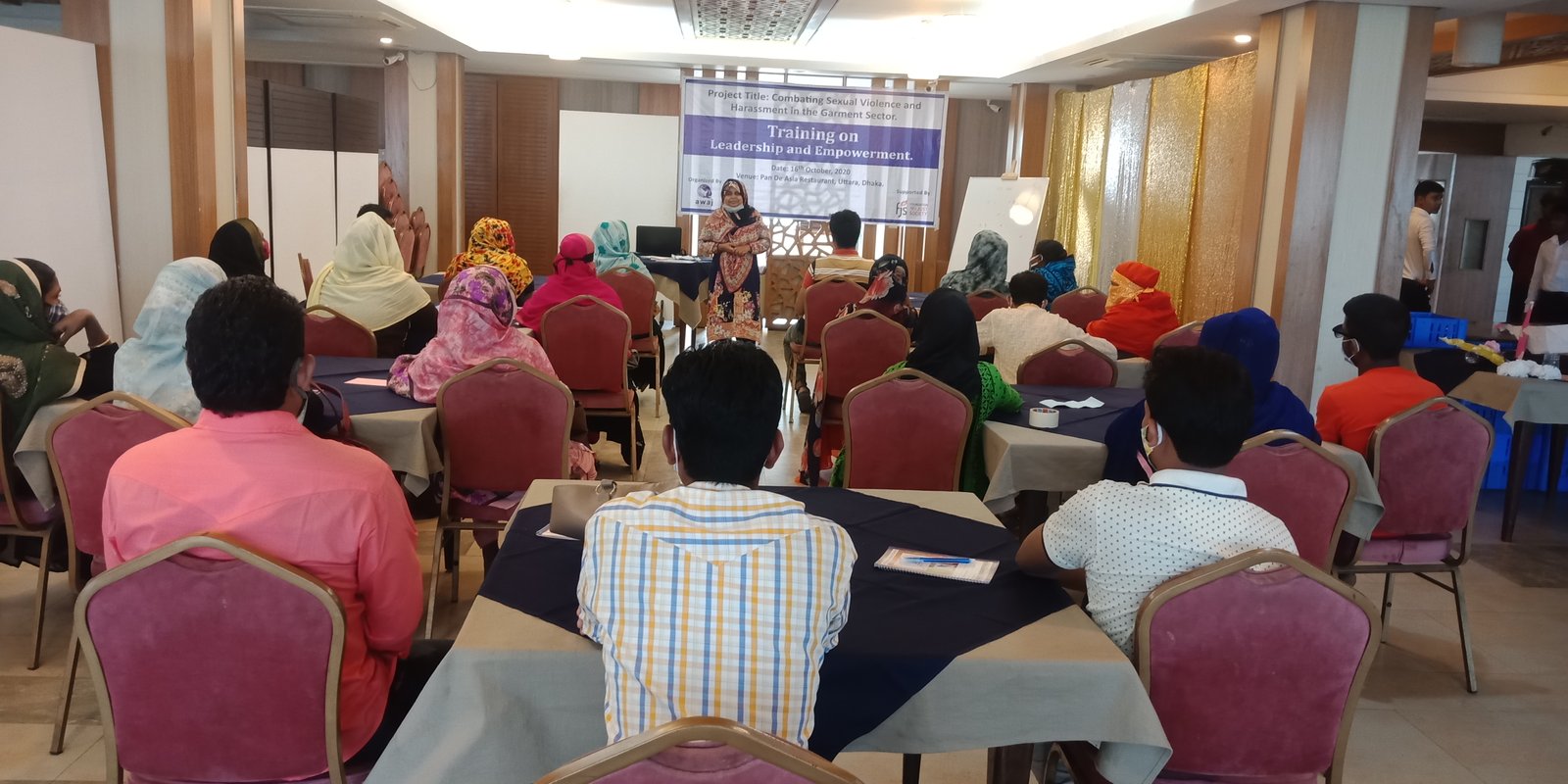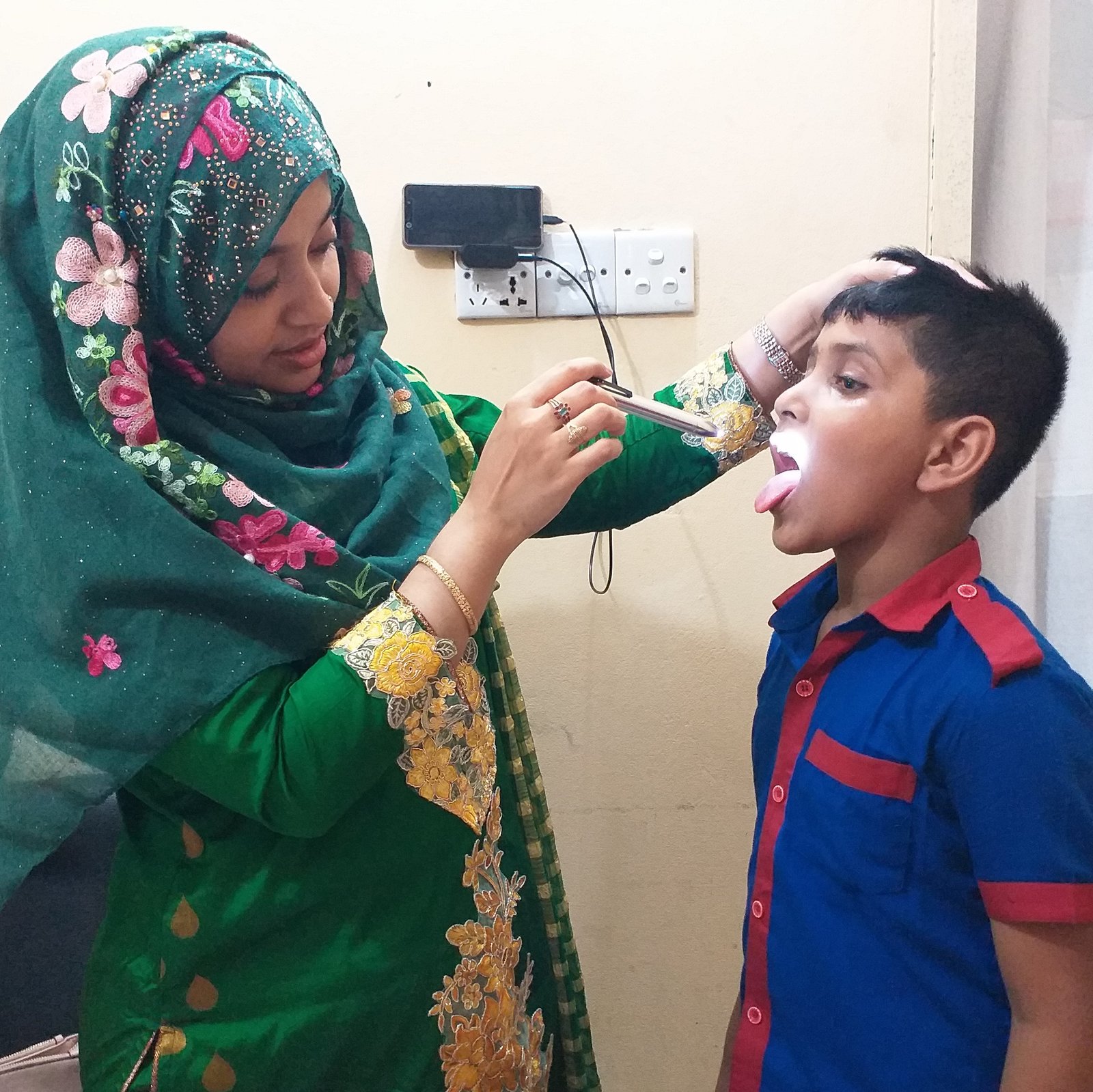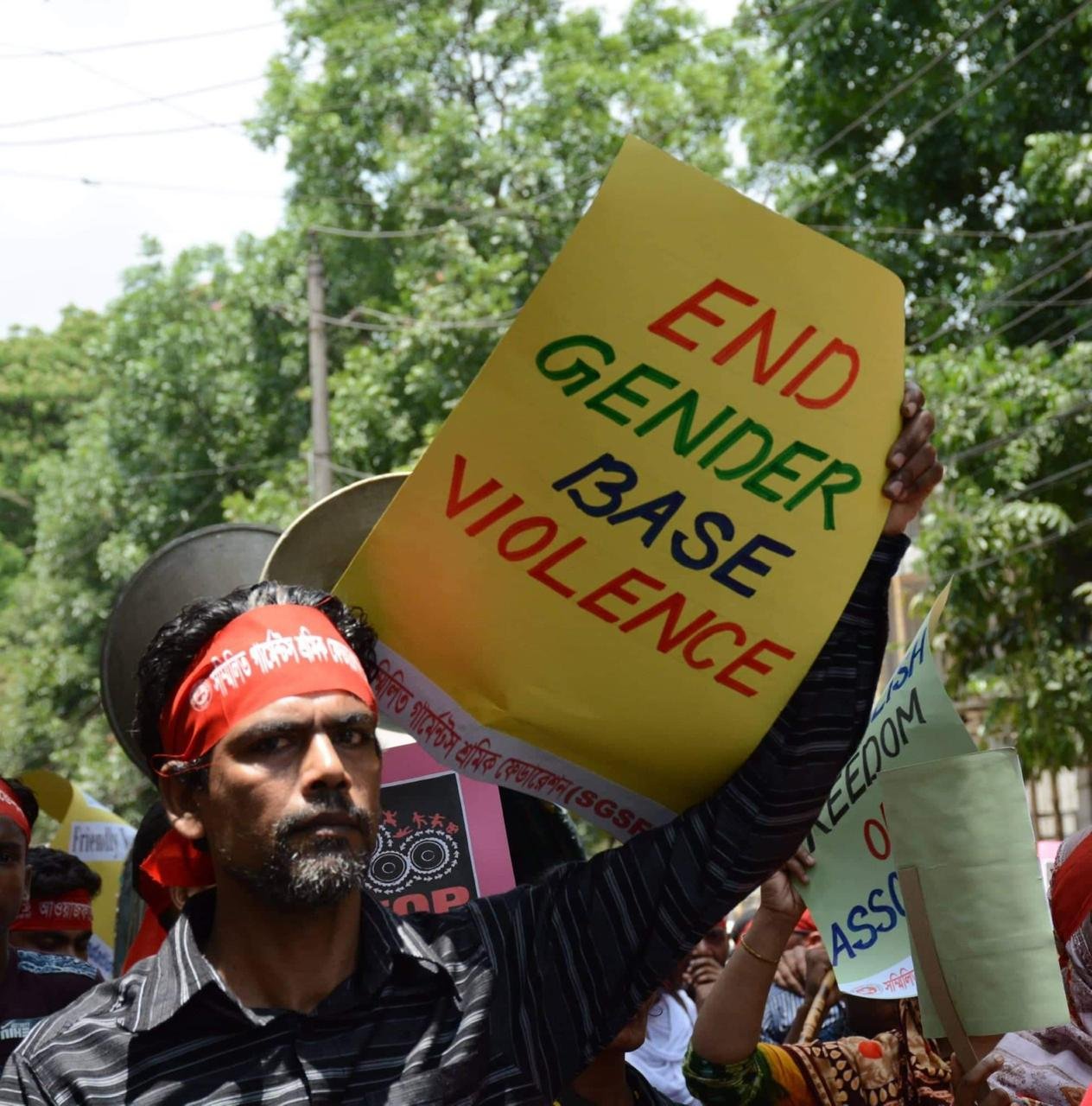Awaj Foundation takes a comprehensive approach to improving the lives of workers. We provide support to workers both inside the factories and their communities and through our campaigns. We work with stakeholders such as brands, Bangladesh Garment Manufacturers and Exporters Association (BGMEA), the government, and other policymakers to improve structural conditions for workers in the garment sector and beyond.
Awaj works in the following areas to improve workers’ lives (click on the name to go to the respective section):
- Improving wages
- Strengthening workers’ rights
- Harmonious industrial relations
- Increasing women’s leadership
- Decent working conditions
- Life skills beyond the factory
- Services for workers
- Legal aid
- Health services
- Schools and daycare centers
- Migrant workers’ rights
- Research and advocacy
Improving wages
Since its inception, Awaj has worked to ensure living wages for all workers in the RMG, knitwear, and clothing sector in Bangladesh through:
- Increased awareness amongst workers on minimum wage laws, and the benefits to which they are entitled under Bangladesh’s labour laws
- Improved negotiation skills of workers
- Facilitation of Collective Bargaining Agreements
Awaj Foundation continues to be active in national advocacy campaigns to ensure workers receive living wages, and can enjoy the benefits provided to them by Bangladesh’s labour laws.
Strengthening workers rights
RMG workers have rights that they are often unaware of, or which their factories deny them access. Awaj trains workers to recognise and enforce their rights on working hours, paid annual leave, and sick leave.
To strengthen demands of the enforcement of these rights, Awaj helps set up committees for workers to collectively raise their demands with factory management:
- Participation committees
- Safety committees
- Anti-harassment committees
A trade union is the strongest mechanism for workers to demand their rights. Awaj actively trains workers on the formation and operation of trade unions, with emphasis on women union leaders.
Hanifa works to ensure stronger safety nets for her colleagues and herself
Hanifa (pseudonym) is an operator in 4A Yarn Dyeing (Jacket) Limited. She has been working at the factory for the past 8 years.
Before coming to Awaj Foundation Hanifa was unaware of the benefits of being part of a union. She visited Awaj in 2019, where she learnt of the healthcare, daycare, and legal support services provided by the foundation. Awaj trained Hanifa on various key skills including:
- Leadership and negotiation skills
- Conflict resolution skills
- Methods of organising and forming trade unions
- Facilitating Collective Bargaining Agreements
Following the training sessions, Hanifa was able to successfully set up a union in her factory in December 2019. In 2020, Hanifa and her colleagues in the union were in the process of negotiating a Collective Bargaining Agreement with their factory management.
Harmonious industrial relations
Awaj promotes harmonious industrial relations through constructive social dialogues between workers and factory management. This is achieved through training workers in negotiation skills.
The foundation has also trained 2,000 members of factory management on workers’ rights under national and international legal frameworks.
Awaj also facilitates the formation of Collective Bargaining Agreements (CBAs) between workers’ unions and factory management. Awaj’s sister trade union federation, Sommilito Garments Sramik Federation (SGSF), plays a crucial role in providing technical and legal guidance to unions during these negotiations.
In 2019, Awaj Foundation facilitated the renewal of 2 CBAs for Natural Denims Ltd Sommilito Sramik Union and Donglian Fashion BD Ltd Sommilito Sramik Union. In 2020, Awaj facilitated the signing of 2 CBAs for Hop Lun Apparels Ltd Unit 2 Sommilito Sramik Union and the Fun Factory Ltd.
Case study
Collective Bargaining Agreement signed between Hop Lun Apparels Ltd. and the Hop Lun Apparels Ltd. Sommilito Sramik Union (HLALSSU)
Awaj facilitated a Collective Bargaining Agreement for the Hop Lun Apparels Ltd. Sommilito Sramik Union (HLALSSU) with Hop Lun Apparels Ltd in 2020, during the COVID-19 pandemic, under the leadership of union leader Aklima Akhter.
Increasing women’s leadership
Awaj Foundation believes that when women take the lead, they can transform the workplace into a fairer, more equitable workplace. In order to create women leaders, Awaj develops their capacities in the following areas:
- Rights awareness
- Communications
- Negotiation and bargaining
- Computer literacy
- Paralegal training
Awaj also mentors union members and leaders from SGSF following their capacity development, and supports their professional development and increased leadership initiatives.
Awaj started with the will and determination of one woman leader. The foundation is thus developing the next generation of women leaders who will work for the welfare of workers at both national and international levels.
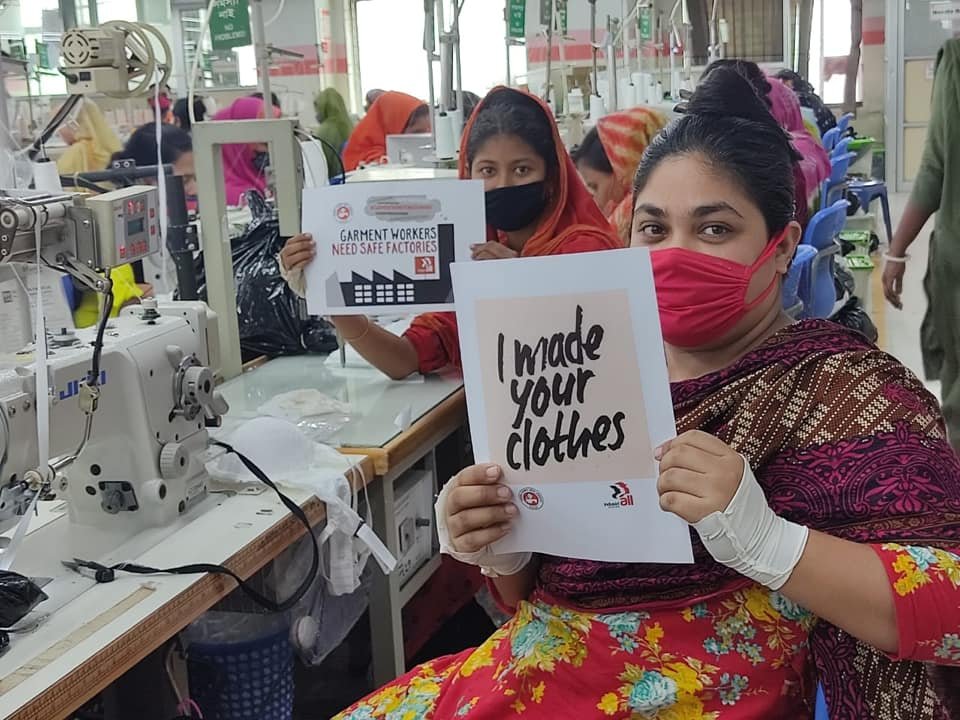
Decent working conditions
Ensuring decent working conditions is a cross-cutting focus for all Awaj programmes. This ranges across Awaj’s work in:
- occupational safety and health
- fighting gender-based violence
- raising awareness of rights
- leadership development
- fostering harmonious relationships
- research advocacy
Accomplishment over 2019-2020
- 60 workers in Chittagong were trained on GBV and anti-harassment measures
- 1 anti-harassment committee (AHC) set up in Chittagong
- As a member of Gender Platform, Awaj Foundation has contributed a significant role in submitting a draft law named “Prevention and protection of Sexual Harassment”, which has been submitted to Law Ministry Bangladesh in light of high court verdict.
- 5,020 workers trained on GBV and identification and tackling of harassment in the workplace
- 17 OSH training sessions, 510 workers trained on OSH measures
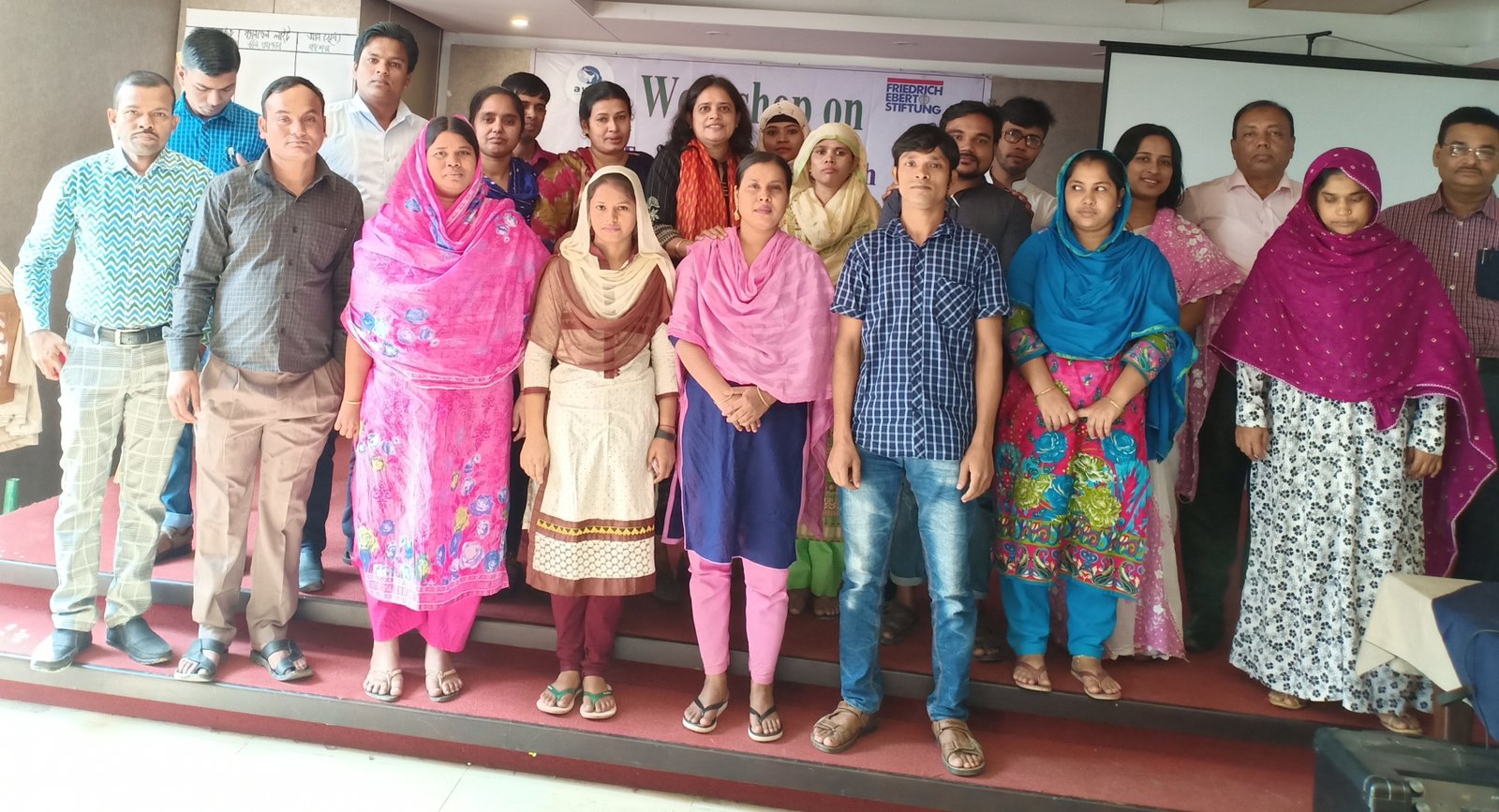
Program highlight
Strengthening civil society and public institutions to address gender-based violence
July 2017 – September 2021
Manusher Jonno Foundation (MJF)
80% of Bangladesh’s 4.5 million-strong RMG workforce is composed of women. Anti-harassment and gender-based violence laws have not evolved at the pace of the sector itself.
Awaj Foundation’s project with MJF is working to reduce these instances of gender-based violence. The project is directly targeted to 800 individuals, and indirectly to 1,800 individuals to:
- Reduce the prevalence of violence against women workers in the RMG sector
- Reduce the prevalence of violence against women RMG workers in their personal lives
- Improve access to services by making institutions more accountable and responsive
- Strengthen public institutions and factory management to address complaints of gender-based violence
Activities under the programme over 2019 – 2020
- 1 advocacy session with factory management, policy makers, and factory owners to form Anti Sexual Harassment Committees inside the factory per the High Court of Bangladesh guidelines
- 30 women workers groups with 600 members, and 10 men worker groups with 200 members formed to raise awareness of harassment in the workplace, and to build anti-harassment committees
- Local Government Elected Body trained on gender, rights, and labour issues
- Regular liaison with factory management and service providers, and monitoring of complaints redressal mechanism for VAW
- 1 2-day training on gender harassment against women and GBV
- 1 1-day refresher training on gender, harassment against women, and GBV
- 1 transformative leadership training for women workers
- 1 1-day orientation training with men workers
- 1 preparatory meeting with the factory management of Glitters Fashion Ltd
- 1 day-long orientation of an Anti-Harassment Committee (AHCs) in 1 factory with 10 workers, of whom 8 were women
- 4 quarterly meetings with AHCs
- 1 workshop on future plans for 1 AHC with 8 women leaders and members of the AHC
- 1 dialogue with service delivery institutions to conduct sensitisation sessions on GBV issues. Participating factories and service delivery institutions included Baizid Bostami Thana, Panchlaish Thana, Victim Support Centre, DIFE, BLAST, Mamata, BRAC, Shishu Academy, Aparajeyo Bangladesh, UCEP Bangladesh, Clifton Textile and Apparels Ltd, Clifton Apparels Ltd, and Glitter Fashion Ltd
- Special day observation for International Women’s Day, May Day, Human Rights Day, and the International Day for the Elimination of Violence Against Women (VAW)
- 6 monthly meetings with the ward commissioners of Jalalabad Ward 2 and Shulokhobor Ward 8, and representatives of their offices
Activities under the programme over July 2019 to June 2020
Life skills beyond the factory
In the interest of promoting a healthy and well-balanced life beyond the workplace, Awaj trains workers on important life skills. These include financial management and well-balanced diets. These training sessions are disseminated through women’s cafes, where participants share their experiences and knowledge with their neighbours for the holistic development of the community.
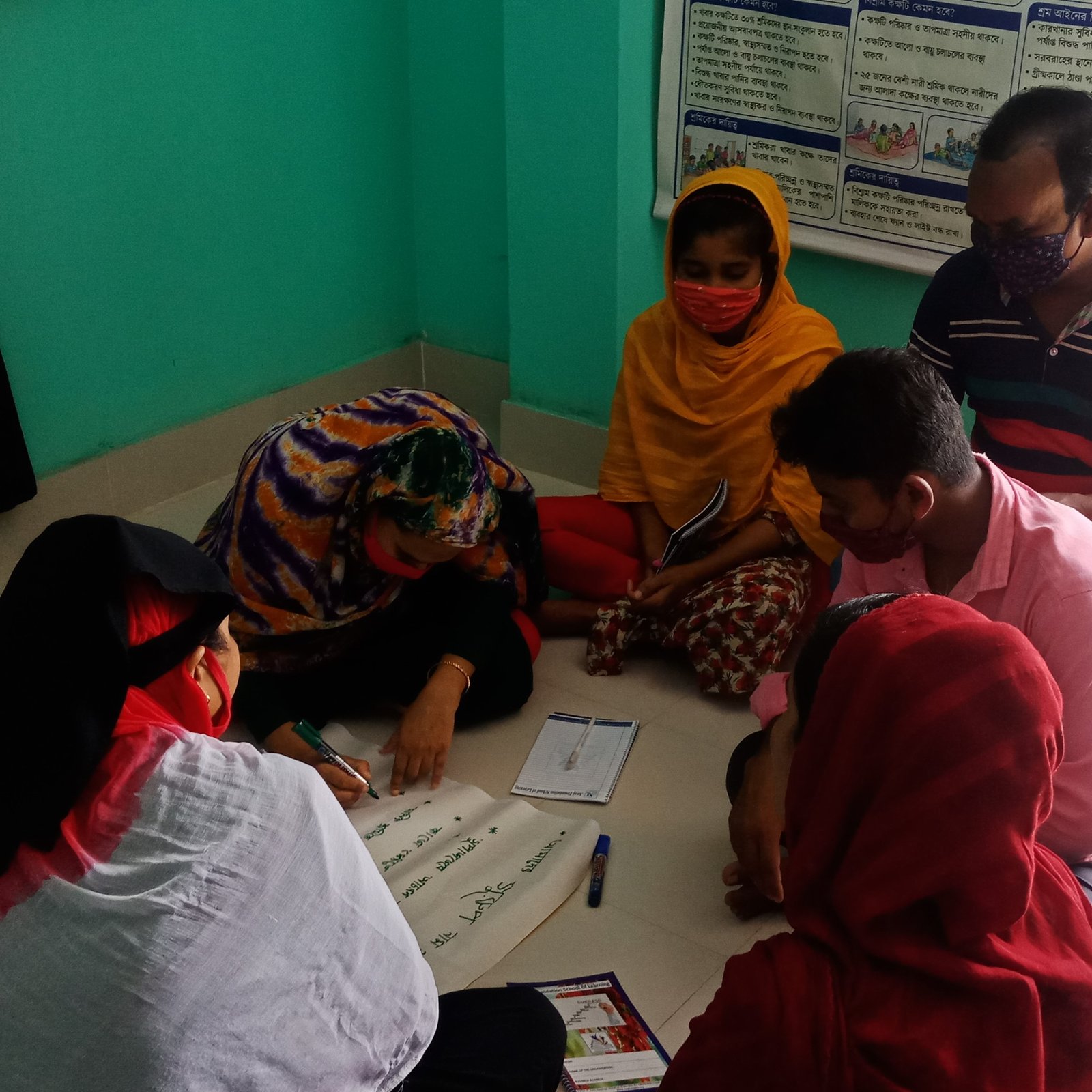
Program highlight
UP! – Improving livelihoods and quality of life for women workers in Bangladesh RMG sector
January 2019 – December 2022
Laudes Foundation
UP! + 2019 is a community-based training programme implemented by Awaj Foundation with the support of Impactt Ltd and funded by Laudes Foundation for RMG factories in Dhaka and Chittagong.
UP! July 2019 to June 2020
- Better outcomes for workers through a bargaining agenda. This was evidenced by the Natural Denim factory management who committed to the payment of BDT 500 per ultrasound for female employees
- 15,000 UP! +1 and 1,550 of UP! +2 graduates trained in more sophisticated bargaining skills
- Awaj established as an effective membership organisation delivering concrete benefits to members. Awaj advocated for effective freedom of association and collective bargaining. It enabled the voices of workers to be heard by key local and international audience
- 1,560 workers were recruited for the programme. Of these, 1,401 were women and 159 were men
- All 1,560 workers were trained in all UP! + 1 modules
- 319 workers from the previous UP! phase were trained on negotiation and rights. Of these, 260 were women and 57 were men. 1,450 workers will be trained on these modules in total
- 98% of all workers recruited for the programme over three phases were trained on the negotiation and rights module
- 315 members of the community participated in sensitisation meetings. The project will train 520 members of the community in total, by December 2022
- 77 women who had participated in the UP! +1 programme joined savings schemes within 3 months of having received their training. The programme aims to have at least 40% join formal savings programmes by December 2022
- 151 women who had participated in the UP! +1 programme reported to have an increased say in household financial decisions. The programme aims to have at least 50% participants report the same by December 2022
Sima’s story
24-year-old Sima moved from Barisal to Dhaka in 2015. She has four younger siblings in Barisal. Her father, a farmhand, supported his family for decades, but had started showing signs of his age.
In order to support him, and the rest of her family, Sima decided to join the workforce, and ended up finding a job at a garment factory. She started sending half her monthly salary to support her parents, but found it difficult to pay her own living costs in Dhaka. Sima started taking loans from her colleagues and friends to pay her way, but realised that she was sinking deeper into debt. She could not find a way out, nor could she recognise corners that she could cut herself to reduce her personal expenses.
UP! Change in thyself
Sima recognised she was spending too much on clothing and expensive food items, and was not saving what she could feasibly save. UP! +1 trained Sima and her colleagues on monthly income and expenditure analysis and budgeting techniques. Sima was surprised to find that with proper budgeting, she was able to save some money, even after she had sent half of it to her family in Barisal.
Sima joined a savings scheme in January 2020. While she was not able to save much before the pandemic hit, it was important that she had some savings to tide her through.
Sima was also able to bring about changes in her factory with UP! +2 training. She learned negotiation skills and advised her colleagues and the factory itself on illegal practices within the factory. Conditions in the factory changed over a series of meetings, and she feels that her life has improved as a result.
Services for workers
Awaj provides three core services to further its mandate of improved labour conditions for garments and leather workers in Bangladesh:
- Legal aid
- Health services
- Schools and daycare centres
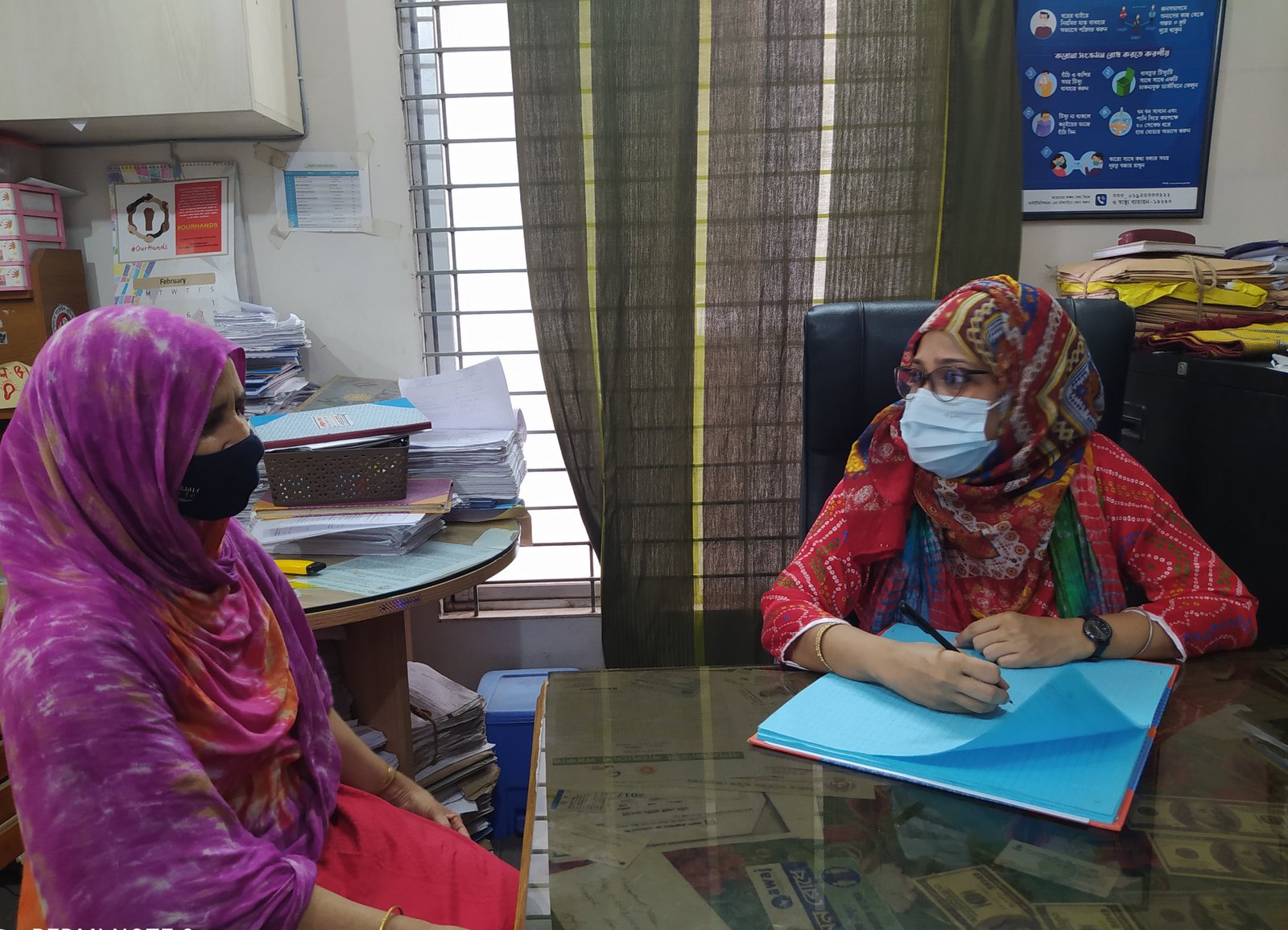
Legal aid
Awaj Foundation is one of the largest legal aid providers in Bangladesh. The foundation supports workers in workplace disputes, family law issues, and in personal legal matters. Over 2019 – 2020:
- Awaj provided legal support to 658 workers across Bangladesh
- 55 disputes were resolved through arbitration
- 278 cases were filed to the labour court
- Workers were able to recover BDT 1,530,991 in back pay, severance pay, and other benefits that they were deprived of from their employers
Program highlight
Improved health for workers and their children
January 2015 – December 2021
Donor: KiK Textilien und Non-Food GmbH
Since 2015, KiK Textilien und Non-Food GmbH has been funding Awaj’s work in the improved wellbeing of RMG workers and their children. With their support, Awaj has been operating 7 healthcare centres, daycare centres, and pre-schools in the Bagherbazar, Sreepur, Gazipur, Ashulia, and Savar industrial areas in the Dhaka division.
Garment workers and their children receive free healthcare consultation, diagnostic support, and urgent surgical support in these centres. Their children have access to a safe, warm, and caring environment for them to learn and play in, in the daycare centre and pre-school.
Healthcare services under the programme
- 7 healthcare centres running in Rasulbagh, Mirpur, Hemayetpur, and Ashulia in Dhaka, Malekerbari and Bagerbazaar and Gazipur, and Naryanganj
- Services to workers from full-time women doctors and nurses
- Services included free diagnostic tests, urgent surgeries, subsidised medications
RMG workers are often deprived of access to healthcare services offered by Government service providers, as they are unable to visit those centers during work hours. Awaj’s healthcare services are modelled around the workers’ schedules, allowing them to visit doctors beyond their own work hours.
Awaj’s healthcare centres provide free health consultations and subsidised medicines to RMG workers.
Services from July 2019 to June 2020
- 8,258 women workers, 2,589 men workers, and 719 children received healthcare services
- 2,076 women workers received sanitary napkins
- 13 workers received financial aid for urgent life-saving surgery and long-term treatment
Preschool and daycare centre
According to Bangladesh labour laws, RMG workers are privy to daycare for their children. But most factories are still not equipped to provide adequate or quality care for children. In response to this, and with the support of KiK, Awaj has launched a community daycare centre and preschool programme in Bagherbazar, Gazipur for garment workers in the area.
Awaj’s daycare centres and preschools provided quality care for children of workers in the garment sector. This allowed female workers to work without worrying about care for their children.
Awaj had 20 children in its daycare centres from July 2019 to June 2020. The children received healthy, nutritious meals every day and had access to a range of healthcare services. There are 40 students from Classes 1 to 4 in Awaj’s schools.
Eyecare support to RMG workers
Awaj Foundation, with the support of Fred Hollows Foundation and Australian Aid, has been providing eye care support to RMG workers and their families since 2018 in 7 women’s cafes in Dhaka and Chittagong. The programme aims to train workers on eye diseases and to raise awareness on the prevention of these diseases. In 2019-2020, Awaj provided eye care support to 1368 workers.
Migrant workers rights
Awaj Foundation’s work with migrant workers stemmed from the need of its members. These members were migrating abroad for RMG and domestic sector work. Awaj’s overseas migration program has assisted migrant workers through 2019 – 2020 by:
Amplifying workers’ rights: safe migration and anti-trafficking programmes
The remittance from migrant and garment workers is the principal source of foreign currency in Bangladesh. The country has over 12 million migrant workers in 165 countries. Despite their contribution to the Bangladesh economy, these migrant workers suffer from a series of legal and humanitarian injustices without finding a resolution.
Awaj Foundation provides a range of services to migrant workers at all stages of the migration process to ensure safe and legal migration. Awaj:
- Provides support and advocates for better conditions for migrant workers
- Provides a platform for legal support, education, and the opportunity to interact with other migrant workers
- Advocates and lobbies with national, regional, and international government organisations, NGOs, INGOs, and UN agencies to ensure the well-being of migrants
- Provides support with repatriation and reintegration
- Supports victims receive compensation through arbitration
- Empowers migrant workers and their families through awareness campaigns
Awaj project for migrant workers
- Initiative to improve access to justice for the female migrant workers of Bangladesh, December 2019 to December 2021
- From June 2019 to June 2020, Awaj received requests for support for 101 migrant workers. 60 of those cases were settled during that period
Case study
Win for Bangladeshi workers in Jordan
“When I started working here, my employer did not give me a valid work permit. They said the process would be long and complicated. He asked me to file a General Diary with the police, saying that that would in fact keep me protected. I agreed, not realising that he would use that same GD to coerce me to work for him in untenable circumstances. We started a strike against the employer, and went to the labour court to seek help. On the way back from court, our employer had me arrested by the police on false charges.”
Solaiman, Bangladeshi migrant worker at Rich Door Textile Factory, Jordan
Every year, over 700,000 workers from Bangladesh migrate abroad to secure a better future for themselves and their families. A significant portion of these workers joins the garment sector in other countries, with Jordan appealing to many of them. The workers are often unfamiliar with immigration and migrant workers’ laws and rights and cheated by their employers.
From 1 January 2020 to 7 January 2020, 15 Bangladeshi workers in Jordan decided to protest against the Rich Door Textile Factory in Al Hassan free trade zone outside Irbit.
The workers of the factory sought support from the Sommilito Garments Sramik Federation (SGSF), led by Executive Director of Awaj Foundation Nazma Akter. Nazma immediately contacted local and international labour rights authorities to rescue these workers and ensure they received justice.
While this was going on, Awaj Foundation contacted the Embassy of Bangladesh in Jordan to ensure the safety and protection of these workers. The foundation also kept a close watch over the situation to ensure the safety of all workers concerned. Awaj and our labour rights partners sued the employer on behalf of the 15 Bangladeshi workers at the Jordanian labour court. Our concerted efforts ensured justice for the workers and Mr Solaiman’s freedom.
The employer conceded to the demands of the workers, and promised to ensure they were compensated.
Research and advocacy
Research
Awaj’s research follows a ground-up agenda that responds to the actual needs of workers. This has led to The Worker’s Voice series that provides an in-depth look at the working and living conditions of workers. In partnership with the Asia Pacific Forum for Women, Law and Development (APWLD), Awaj has also commenced a participatory action research project on contractual workers in the country. Findings of the research include:
- Women workers require support in primary healthcare, reproductive health, and education
- Contractual workers suffer from a lack of ID cards, appointment letters, service books, and any form of contractual agreement with employers. They are not privy to minimum wages or paid and maternity leave
- Over 80% of informal workers interviewed mentioned that they were dissatisfied with the payment system
- 100% of interviewees reported that they did not receive any benefits under Bangladeshi labour laws and faced unjust treatment at work
The findings from this research will be followed by:
- Advocacy meeting with employers associations
- Advocacy meetings with factory management and contractors
- Advocacy meetings with representatives of the labour ministry
- Observation of labour and women’s rights days
- Training programme on labour laws and women’s rights for contractual workers
National Advocacy
Awaj’s work in advocacy over 2019 – 2020 included:
- Ratification of ILO convention 190
- High Court verdict on anti-harassment policies in the workplace
- Legalisation of the rights of informal workers
- Regulation of the Collective Bargaining Agreement (CBA) database
- Promotions of CBAs
- 4 webinars on the effects of the pandemic with IndustriALL


